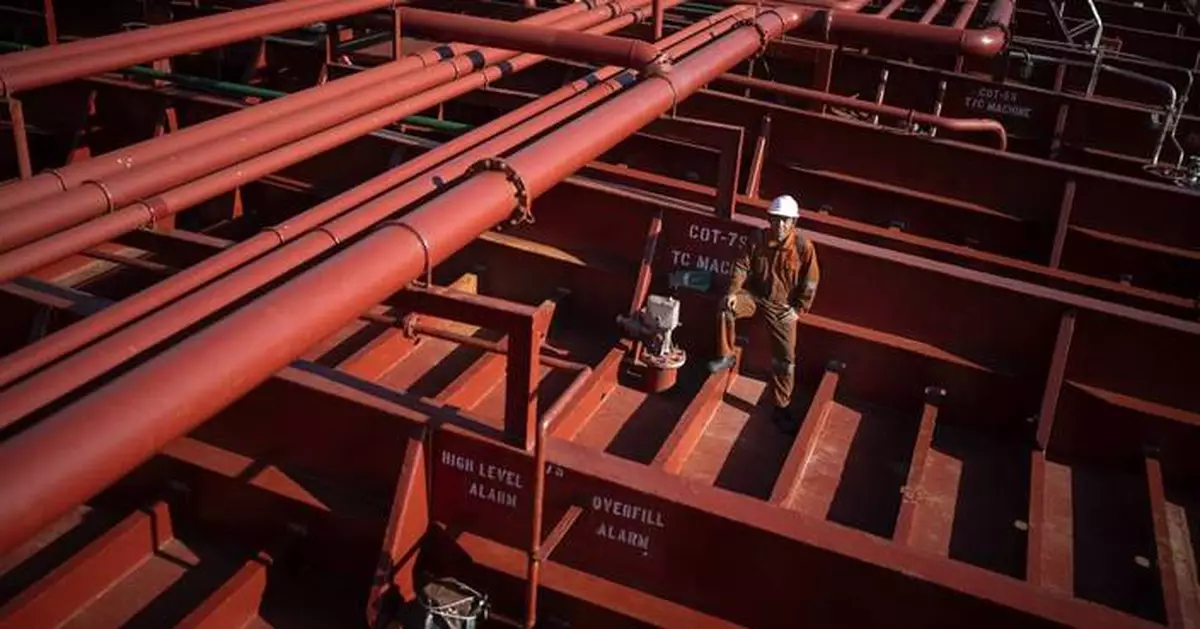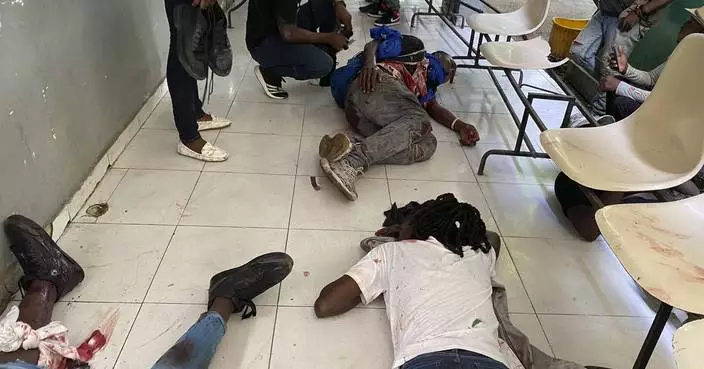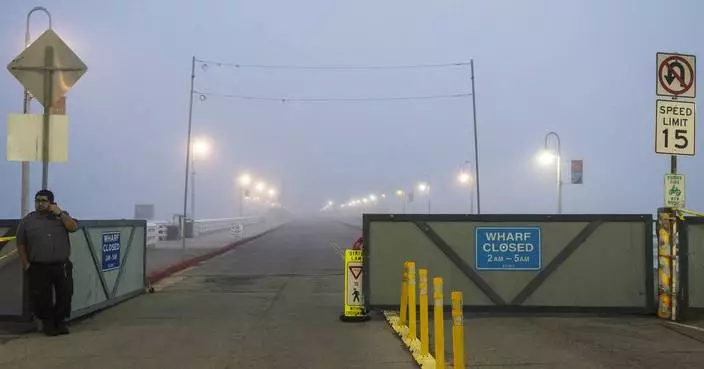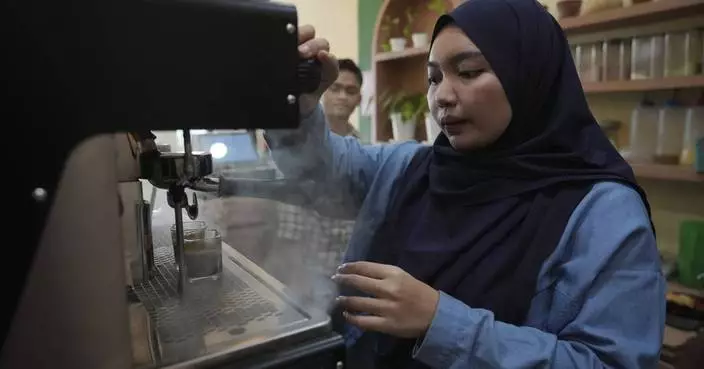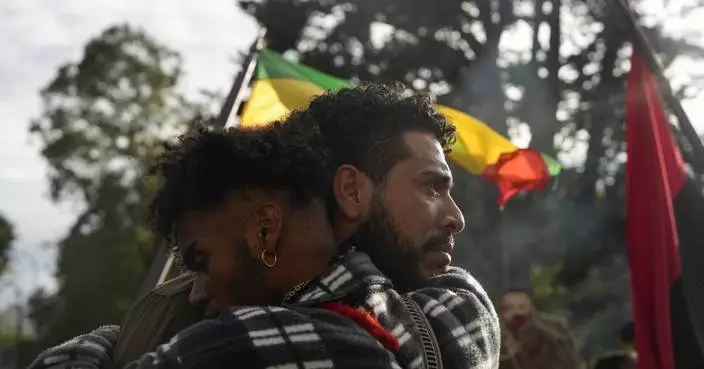BARCELONA, Spain (AP) — On a balmy December evening, four Indian crew members, eager to go explore this Mediterranean city where their container ship docked for a few hours, turned for help to Stella Maris. It’s the largest of the faith-based organizations that minister to seafarers in hundreds of ports around the world.
“We just call them, they help us with everything,” from connecting with far-away families on video to changing currency to delivering small Christmas gifts, said second officer Sunit Kamal.
And they donate Bibles in different languages too, the 33-year-old added in the organization’s small lobby next to a statue of Mary, one of whose ancient titles is “star of the sea,” or Stella Maris in Latin.
Whether it’s offering religious services, helping address labor abuses, or something as practical as serving as a delivery spot for Amazon packages, faith leaders and volunteers don’t see their work as charity.
Rather, their ministry is a way of affirming the human rights of the seafarers who keep global trade moving, often for low wages and in harsh conditions far from most people’s view — even in such popular tourist hotspots as Barcelona.
“It’s all pastoral care because it’s to help a person in what they need as a person,” said Ricard Rodríguez-Martos, the Catholic deacon and former merchant marine captain who leads Stella Maris in Barcelona, where it’s supported by the bishops’ council. “Seafarers are used to being seen by the people on land as a piece of the ship.”
According to the United Nations, more than 80% of the volume of international trade in goods is transported on the seas, making seafarers crucial to consumer products from veggies to cars.
Founded more than 100 years ago in Scotland by a group of Catholic volunteers, Stella Maris is now present in more than 50 countries and 350 ports, from Barcelona to Buenos Aires, from Manila to Miami, said Tim Hill, national director of Stella Maris UK, the biggest national entity in the network.
“Our mission is to provide practical, pastoral and spiritual support to seafarers, fishers and their families of any creed,” Hill said. “We get presented loads of problems.”
The seafarers’ top concern is isolation — especially as stays in port are getting shorter and ships are increasingly ethnically diverse, leaving mostly male crews from places as different as the Philippines and Ukraine with little that’s familiar on extended sea voyages.
Volunteers visiting docked ships are most often asked for SIM cards to contact families, but they also get far graver requests — from hospital visits for injured seafarers to help with bullying, harassment, lack of shore leave, or even cases where a vessel is abandoned and its crew left without food, pay, or the means to go home, Hill said.
Crews often feel safer speaking confidentially with a chaplain, who then can alert law enforcement and help with legal assistance across different countries.
Just last summer, a chaplain in Houston, Texas, alerted Rodríguez-Martos that a ship “with many problems” was headed to Barcelona. The deacon reported it to port authorities, who boarded the vessel in Spain and required the shipowner to fix the issues, Rodríguez-Martos said.
He also works closely with his counterparts in Marseille, France, which is often the previous port of call along the Mediterranean. Just like Barcelona, which hosted the America’s Cup regattas this fall, Marseille starred this year as the venue for Olympic sailing.
But it’s a very different world on the commercial and cruise ship docks and along the dozens of kilometers (miles) that Stella Maris minivans travel daily to get to ships for visits and to bring seafarers back to their offices.
In both cities, the centers include a “club” with a little bar, some souvenirs for sale, basic entertainment like small basketball courts or tables for pool, foosball, and table tennis. Literature includes religious magazines and maps to the cities’ attractions — especially popular since seafarers “need to see something else” after months at sea, said Gérard Pelen, one of the founders of the ministry in Marseille.
Many ask to be taken to Notre Dame de la Garde, the Catholic basilica whose interior is decorated in maritime-themed votive offerings, said Marc Feuillebois, the director of the welcome center in Marseille’s cruise ship terminal. It hosts about 10,000 seafarers a year.
“It’s the first and the last thing they see,” Feuillebois said of the hilltop church that overlooks the bay of Marseille.
Some observant seafarers also ask to be taken to worship services or to have a faith leader hold one onboard, though interest has declined over the years.
“We only get into the subject if we see they’re interested,” Rodríguez-Martos said. He is planning Christmas Eve Mass even though last year not one seafarer showed up for it in the little Stella Maris chapel, where a figure of Christ is fixed to an old anchor as if it were a cross. On Christmas day, ships are often out at sea instead of at ports, where they would have to pay duties also on non-working days.
But regardless of their own practice, seafarers remain very eager to meet with the volunteers and faith leaders for some much-needed, non-judgmental human contact.
“They know what they say, it won’t be shared. Within five minutes, we’re in confidence, without filters,” said Jean-Philippe Rigaud, a Catholic deacon who leads the ministry in Marseille. Rigaud, who’s retired from a career on container ships and then as port pilot, said seafarers share what’s troubling them, ask for prayers or simply about what’s happening in world news.
His wife of nearly 50 years, Marie-Agnes Rigaud, noted the importance of ministering to the seafarers’ families too. She remembers reaching out to the family of a seafarer from the Philippines for whom she had prayed a rosary at the morgue, and she’s frequently hosted some for Christmas meals in their house in a village outside Marseille.
“They’re people who are for the most part very lonely,” said Bryan Parrish, an American Protestant pastor who plans to volunteer at the Marseille mission after starting a “seaman’s club” in La Rochelle, on France’s Atlantic coast, more than 30 years ago.
Tackling that loneliness is at the heart of the mission to seafarers, even in small gestures. On Christmas Eve, for instance, Stella Maris delivered hand-sized Nativity scenes and nougat candy to seven ships docked in Barcelona.
“It’s a way of saying, ’It’s Christmas, we’re thinking of you,” Rodríguez-Martos said.
Associated Press religion coverage receives support through the AP’s collaboration with The Conversation US, with funding from Lilly Endowment Inc. The AP is solely responsible for this content.
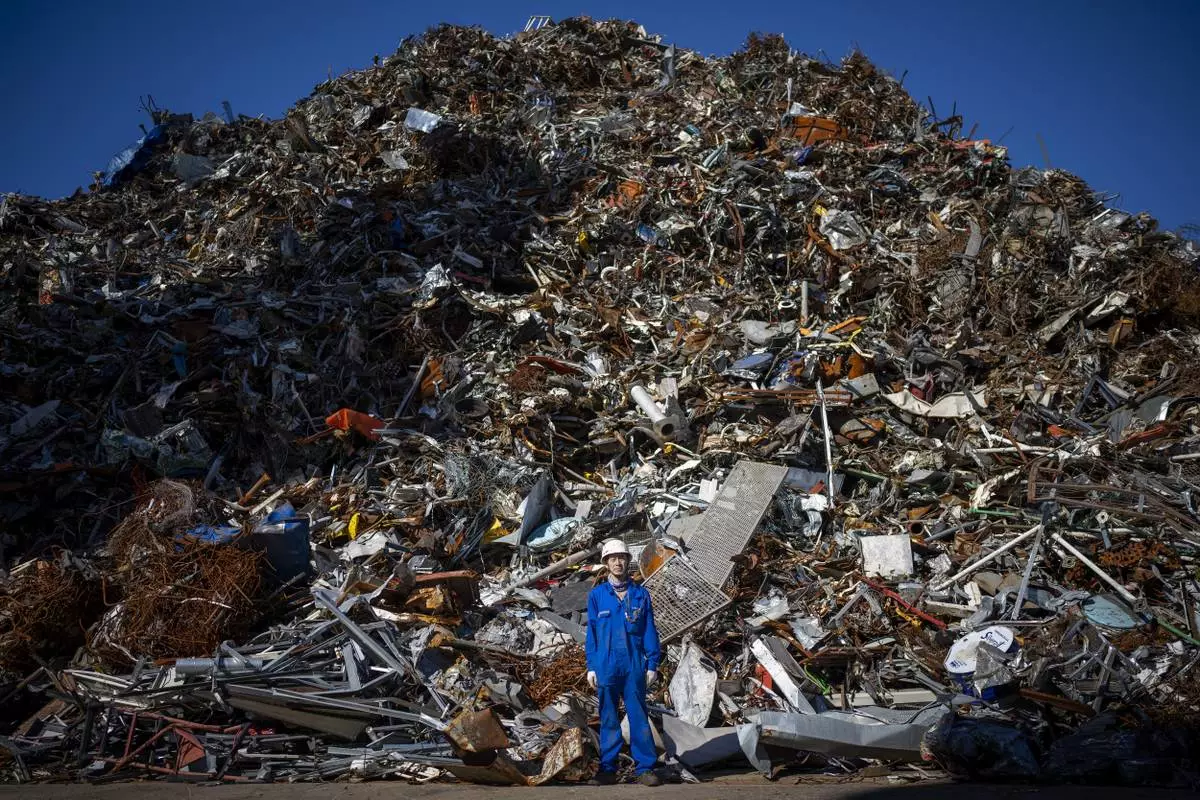
Ma Aijun, 45, of China, poses next to a mountain of scrap metal unloaded from the Chinese merchant ship he works on, at the port of Barcelona, Spain, Friday, Sept. 27, 2024. (AP Photo/Emilio Morenatti)
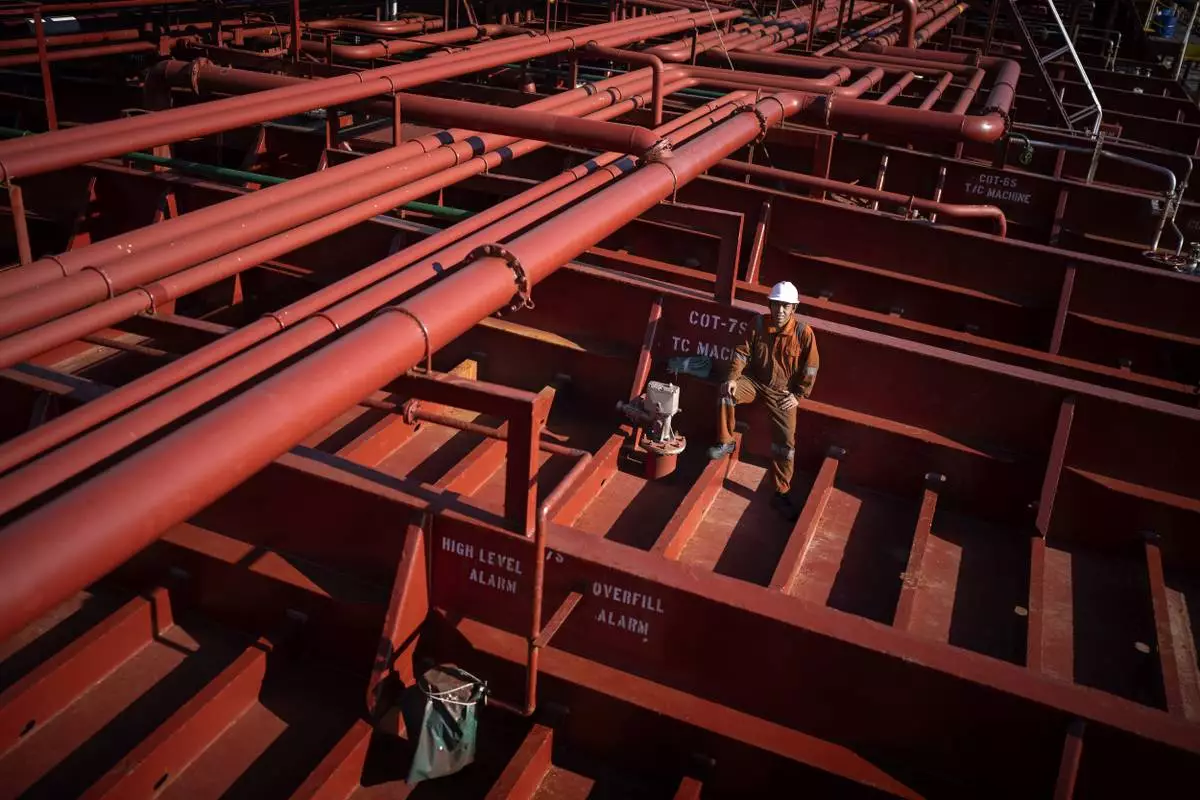
Rahil Gunawan, 55, of Indonesia, poses on the deck of the chemical tanker on which he works as a deckhand while calling at the port of Barcelona, Spain, Friday, Sept. 27, 2024. Gunawan, who has five children and has been working on cargo ships for more than 25 years, spends seven to ten months at sea per year. (AP Photo/Emilio Morenatti)
ISTANBUL (AP) — In a dim one-room apartment in one of Istanbul’s poorest neighborhoods, 11-year-old Atakan Sahin curls up on a threadbare sofa with his siblings to watch TV while their mother stirs a pot of pasta.
The simple meal is all the family of six can look forward to most evenings. Atakan, his two younger brothers and 5-year-old sister are among the one-third of Turkish children living in poverty.
“Look at the state of my children,” said Rukiye Sahin, 28. “I have four children. They don’t get to eat chicken, they don’t get to eat meat. I send them to school with torn shoes.”
Persistently high inflation, triggered by currency depreciation and unconventional economic policies that President Recep Tayyip Erdogan pursued but later abandoned, has left many families struggling to pay for food and housing. Experts say it's creating a lost generation of children who have been forced to grow up too quickly to help their families eke out an existence.
According to a 2023 joint report by UNICEF and the Turkish Statistical Institute, about 7 million of Turkey's roughly 22.2 million children live in poverty.
That deprivation is brought into stark focus in neighborhoods such as Istanbul’s Tarlabasi, where the Sahin family lives just a few minutes’ walk from Istiklal Avenue, a tourism hot spot bristling with brightly lit shops and expensive restaurants.
Meanwhile, the Sahins eat sitting on the floor of their room — the same floor Rukiye and her husband sleep on while their children occupy the room’s sofas. In the chilly early December night, a stove burns scraps of wood to keep them warm. They sometimes fall asleep to the sound of rats scuttling through the building.
Atakan spends his days helping his father scour dumpsters in search of recyclable material to earn the family a meager income.
Poor children in Istanbul also earn money for their families by selling small items such as pens, tissues or bracelets at the bars and cafes in the city's entertainment districts, often working late into the night.
“I can’t go to school because I have no money,” he said. “We have nothing. Can you tell me how I can go? On sunny days, when I don’t go to school, I collect plastic and other things with my father. We sell whatever we find.”
The cash helps buy basic foodstuffs and pay for his siblings to attend school. On the days Atakan can attend, he is ill-equipped to succeed, lacking proper shoes, a coat and textbooks for the English class he loves.
The Sahins struggle to scrape together the money to cover the rent, utilities and other basic expenses as Turkey’s cost-of-living crisis continues to rage. Inflation stood at 47% in November, having peaked at 85% in late 2022. Prices of food and nonalcoholic drinks were 5.1% higher in November than in the previous month.
Under these circumstances, a generation of children is growing up rarely enjoying a full meal of fresh meat or vegetables.
Rukiye and her husband receive 6,000 lira ($173) per month in government welfare to help towards school costs, but they pay the same amount in rent for their home.
“My son says, ‘Mom, it’s raining, my shoes are soaking wet.’ But what can I do?” Rukiye said. “The state doesn’t help me. I’m in this room alone with my children. Who do I have except them?”
The picture of children rummaging through garbage to help support their families is far from the image Turkey presents to the world: that of an influential world power with a vibrant economy favorable to foreign investment.
Erdogan is proud of the social programs his party has introduced since he came to power more than 20 years ago, boasting that the “old days of prohibitions, oppression, deprivation and poverty are completely behind us.”
Speaking at the G20 summit in November, Erdogan described Turkey’s social security system as “one of the most comprehensive and inclusive” in the world. “Our goal is to ensure that not a single poor person remains. We will continue our work until we achieve this,” he said.
Finance Minister Mehmet Simsek, tasked with implementing austerity and taming inflation, said the 17,000 lira ($488) monthly minimum wage isn't low. But he has pledged to raise it as soon as possible.
Although the government allocates billions of lira to struggling households, inflation, which most people agree is far above the official figure, eats into any aid the state can give.
In districts such as Tarlabasi, rents have risen five-fold in recent years due to gentrification in central Istanbul that puts pressure on the housing market for low-income families.
Experts say welfare payments aren't enough for the millions who rely on them, forcing many parents to make impossible choices: Should they pay the rent or buy clothing for the children? Should they send them to school or keep them home to earn a few extra lira?
Volunteers are trying to ease the cycle of deprivation.
Mehmet Yeralan, a 53-year-old former restaurant owner, brings essentials to Tarlabasi’s poor people that they can't afford, including coats, notebooks and the occasional bag of rice.
“Our children do not deserve this,” he said, warming himself by a barrel of burning scrap wood on the street. “Families are in very difficult situations. They cannot buy food for their children and send them to school. Children are on the streets, selling tissues to support their families. We are seeing deep poverty here.”
Hacer Foggo, a poverty researcher and activist, said Turkey is raising a lost generation who are forced to drop out of school to work or are channeled into vocational programs where they work four days and study one day per week, receiving a small fraction of the minimum wage.
“Look at the situation of children,” she said. “Two million of them are in deep poverty. Child labor has become very common. Families choose these education-work programs because children bring in some income. It’s not a real education, just cheaper labor.”
Foggo points to research showing how early childhood education can help break cycles of poverty. Without it, children remain trapped — stunted physically and educationally, and condemned to lifelong disadvantages.
UNICEF placed Turkey 38th out of 39 European Union or Organization for Economic Cooperation and Development countries in terms of child poverty between 2019 and 2021, with a child poverty rate of 34%.
The tragic consequences of this destitution occasionally burst into the public arena.
The deaths of five children in a fire in the western city of Izmir in November happened while their mother was out collecting scrap to sell. The image of their sobbing father, who was escorted from prison in handcuffs to attend his children’s funeral, caused widespread outrage at the desperation and helplessness facing poor families.
It is a situation Rukiye fully understands.
“Sometimes I go to bed hungry, sometimes I go to bed full,” she said. “We can’t move forward, we always fall behind. ... When you don’t have money in your hands, you always fall behind.”
Her eldest son, meanwhile, clings to his childhood dreams. “I want my own room,” Atakan said. “I want to go to school regularly. I want everything to be in order. … I’d like to be a football player one day, to support my family.”
Badendieck reported from Istanbul. Andrew Wilks in Istanbul and Suzan Fraser in Ankara, Turkey, contributed.
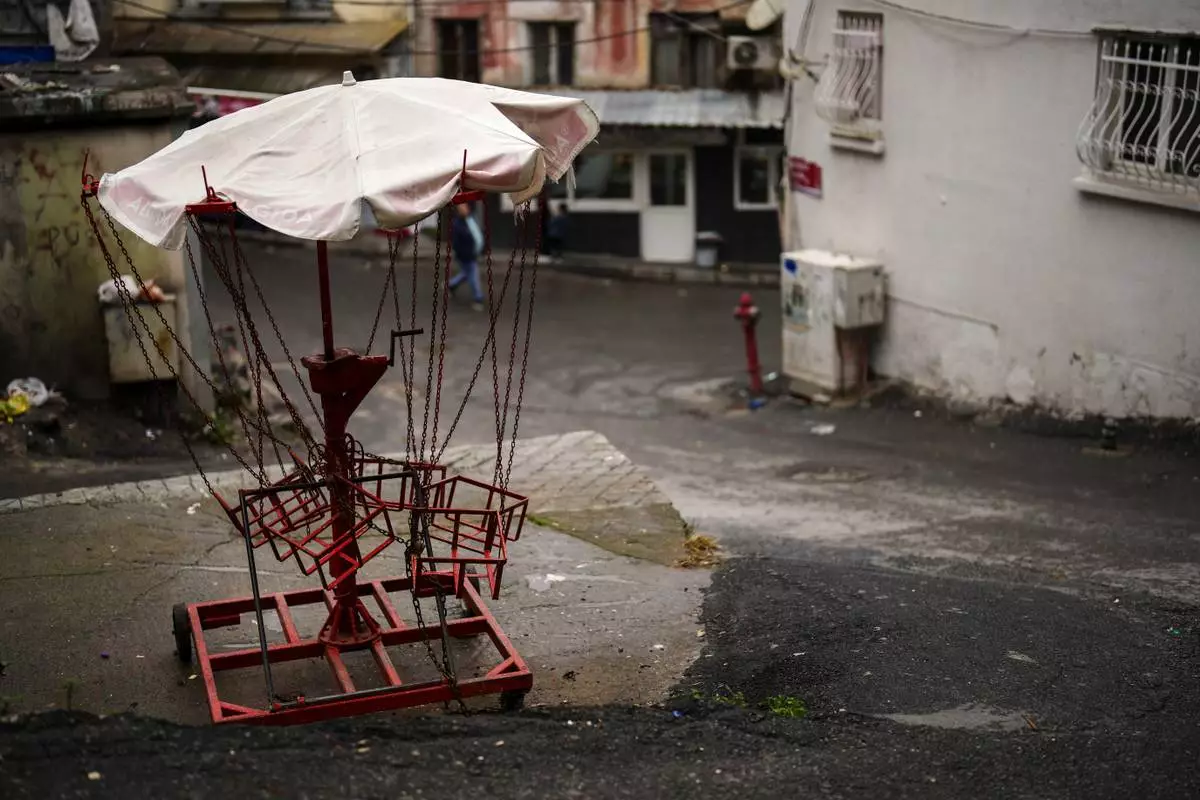
A manually operated carousel is seen in the Tarlabasi neighborhood in Istanbul, Turkey, Wednesday, Dec. 4, 2024. (AP Photo/Francisco Seco)
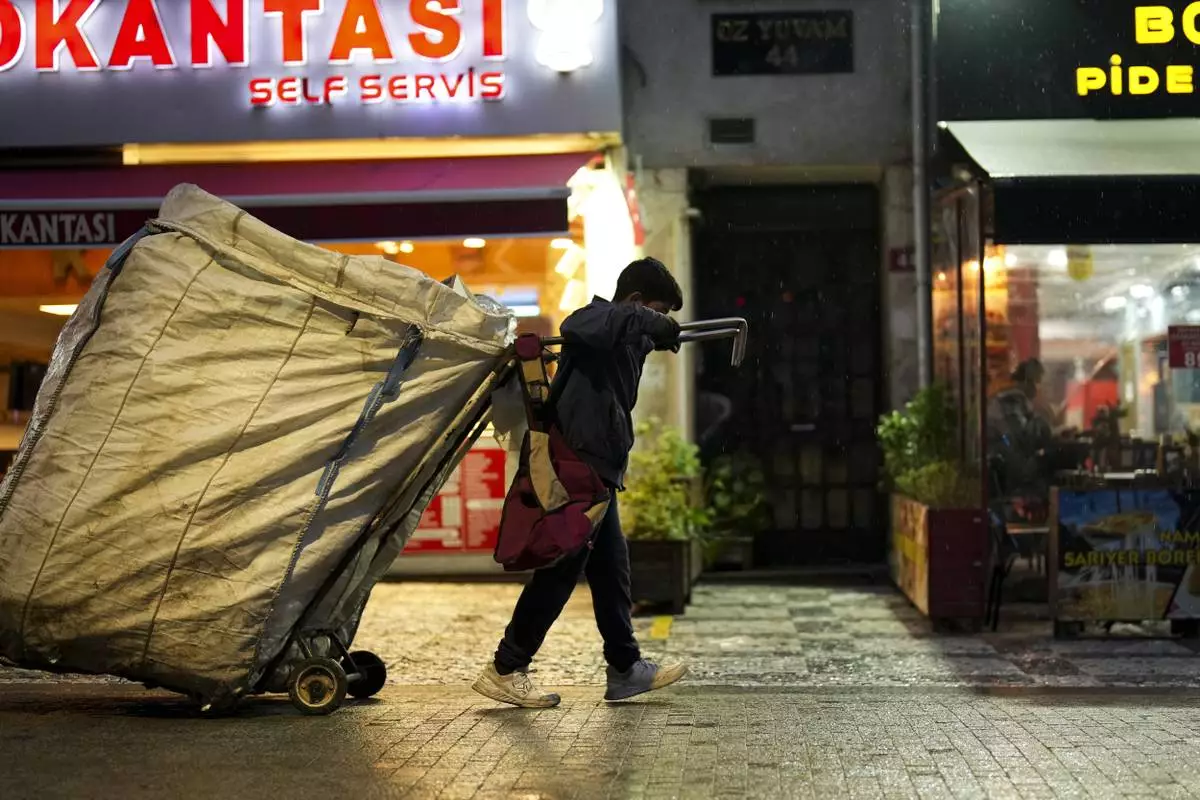
A boy pulls a cart as he scavenges for items in the Kadikoy district in Istanbul, Turkey, Saturday, Dec. 7, 2024. (AP Photo/Francisco Seco)
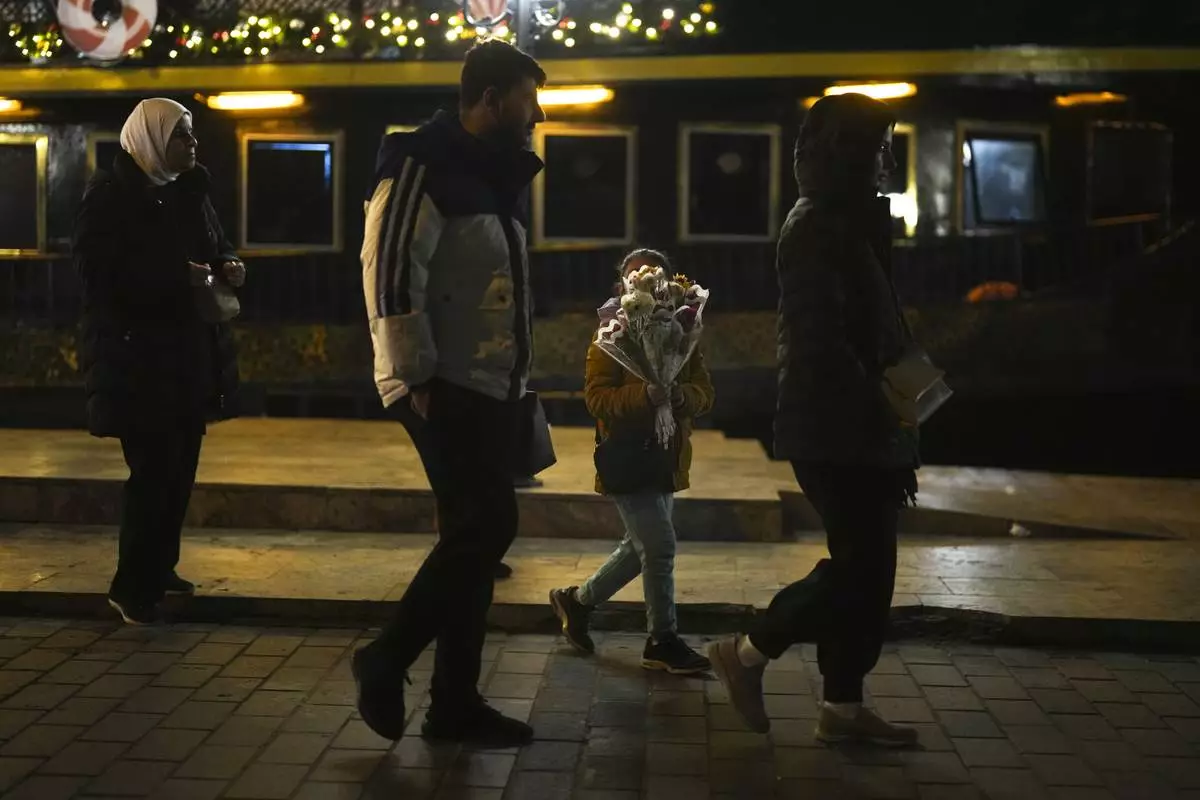
A girl sells flowers to passersby on the Karakoy sea promenade in Istanbul, Turkey, Friday, Dec. 6, 2024. (AP Photo/Francisco Seco)
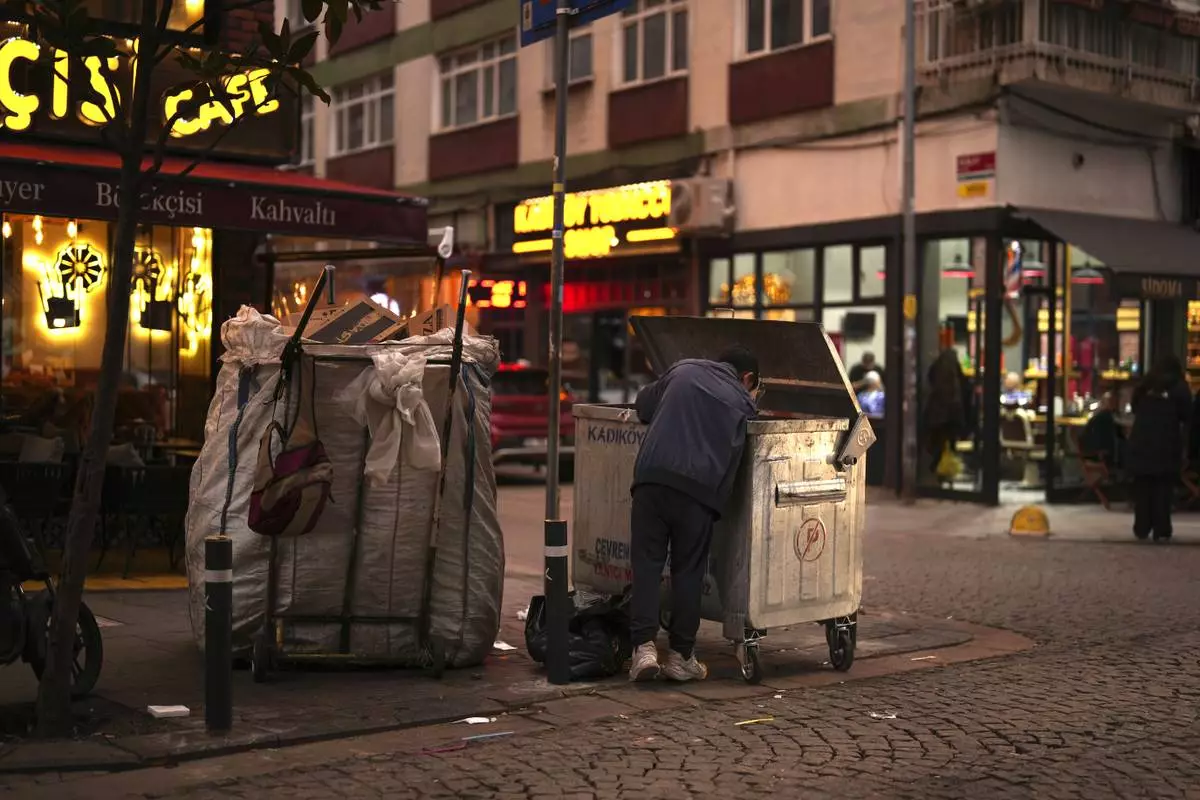
A boy scavenges for items from a trash can in the Kadikoy district in Istanbul, Turkey, Saturday, Dec. 7, 2024. (AP Photo/Francisco Seco)
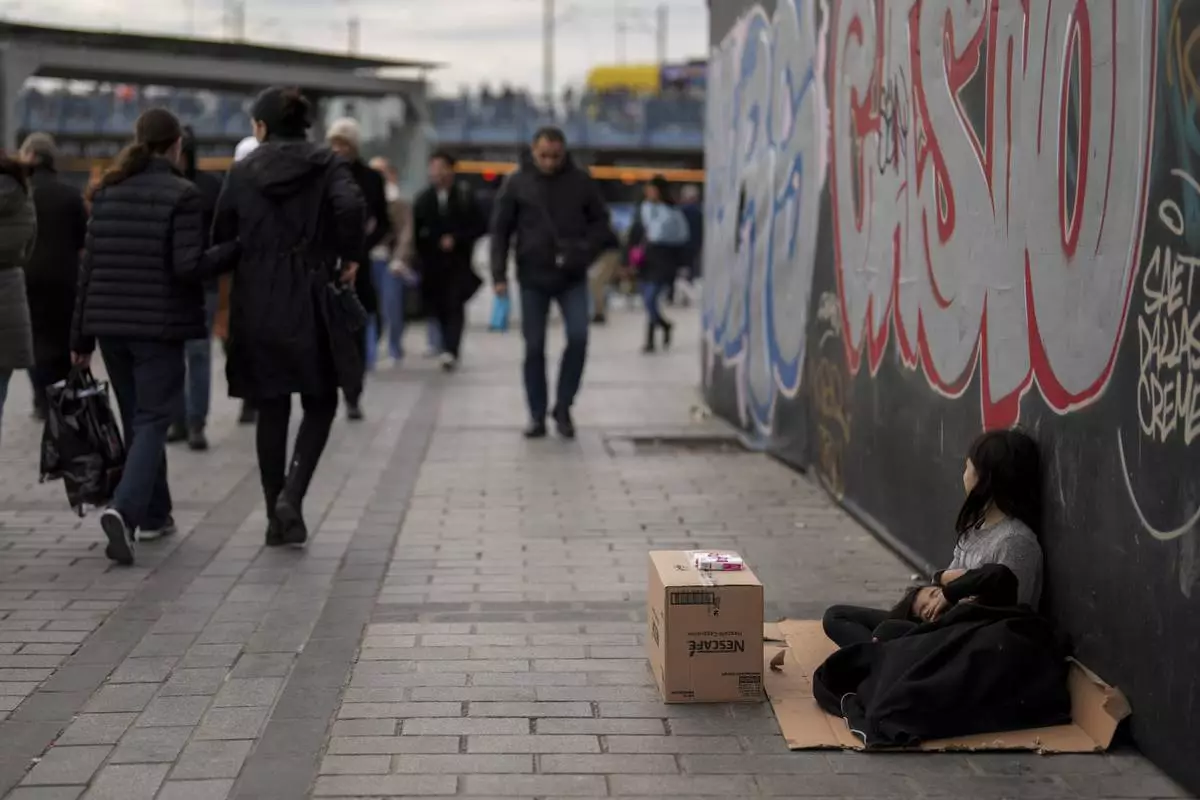
Young girls sell tissues to passersby on the Karakoy sea promenade in Istanbul, Turkey, Saturday, Dec. 7, 2024. (AP Photo/Francisco Seco)
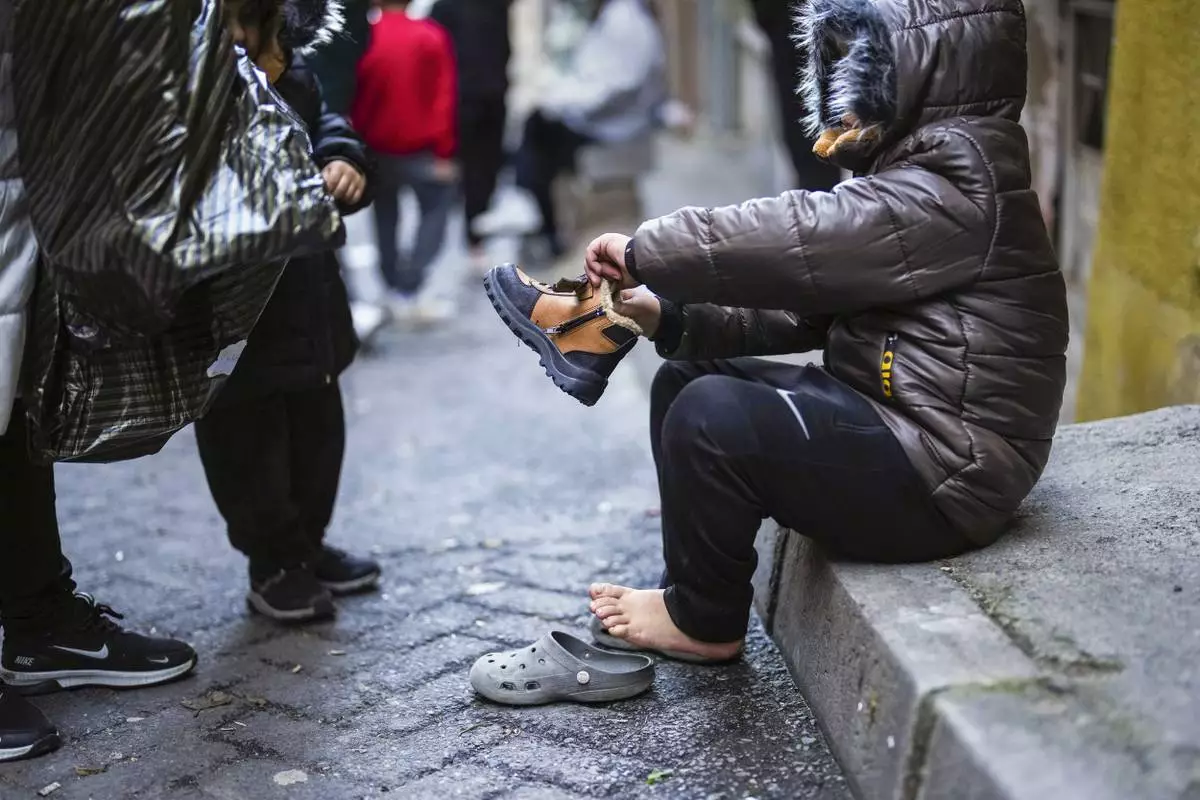
A child tries on a pair of new boots that were handed out by volunteers in the Tarlabasi neighborhood in Istanbul, Turkey, Saturday, Dec. 14, 2024. (AP Photo/Francisco Seco)
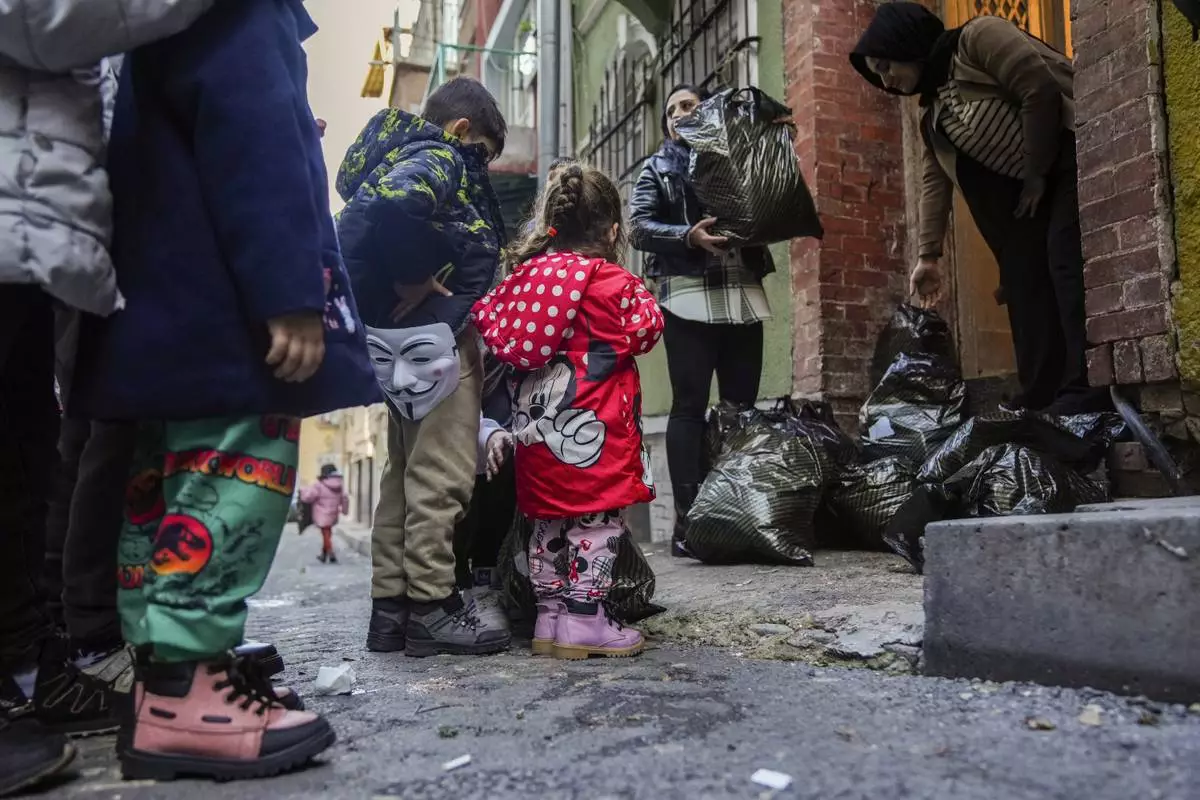
Children and their families wait their turn as coats and shoes are handed out by volunteers in the Tarlabasi neighborhood in Istanbul, Turkey, Saturday, Dec. 14, 2024. (AP Photo/Francisco Seco)
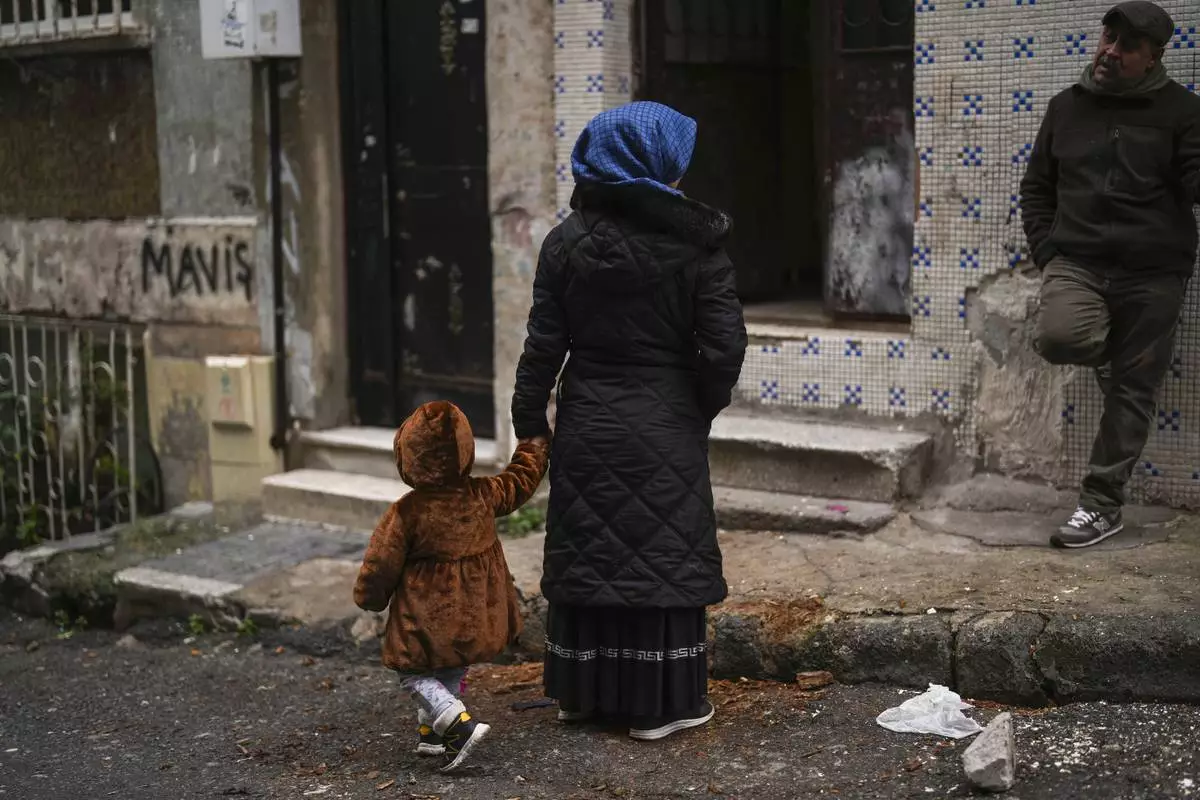
Mehmet Yeralan, 53, a volunteer, talks to a local woman with her child in the Tarlabasi neighborhood in Istanbul, Turkey, Wednesday, Dec. 4, 2024. (AP Photo/Francisco Seco)
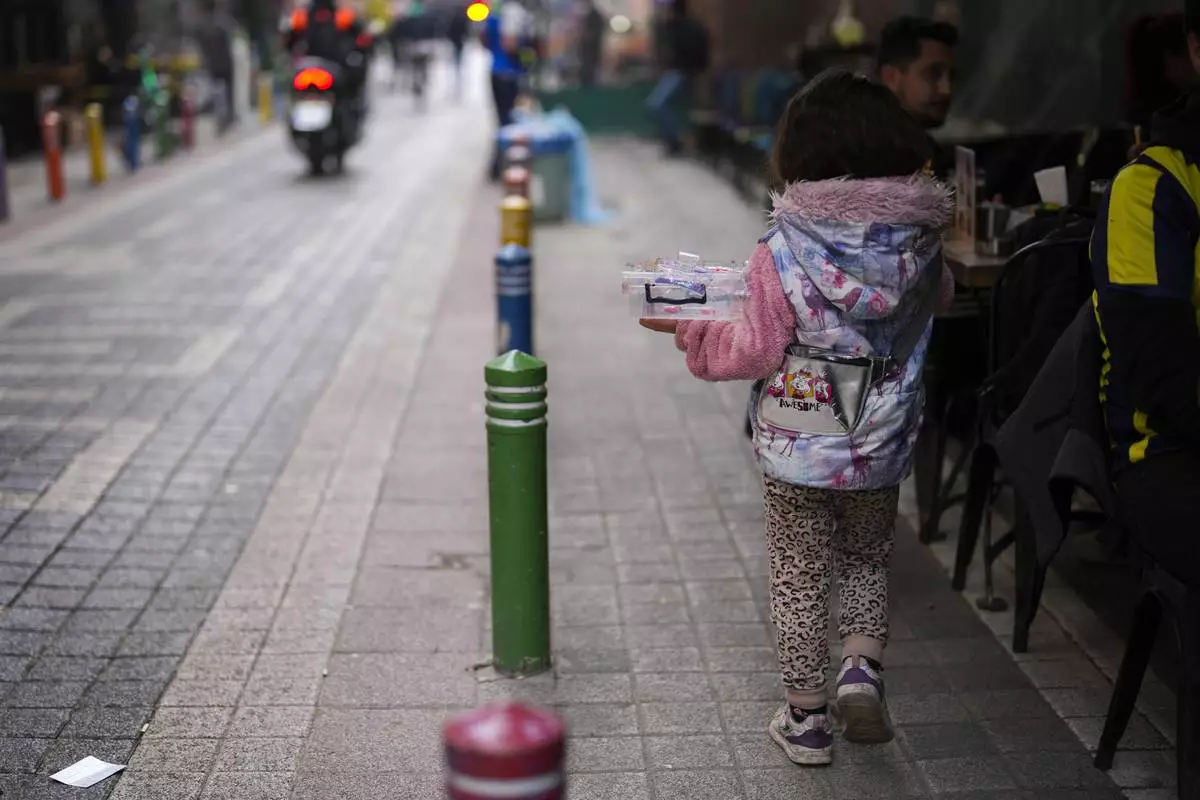
A girl sells plastic items to people in the Kadikoy district in Istanbul, Turkey, Saturday, Dec. 7, 2024. (AP Photo/Francisco Seco)
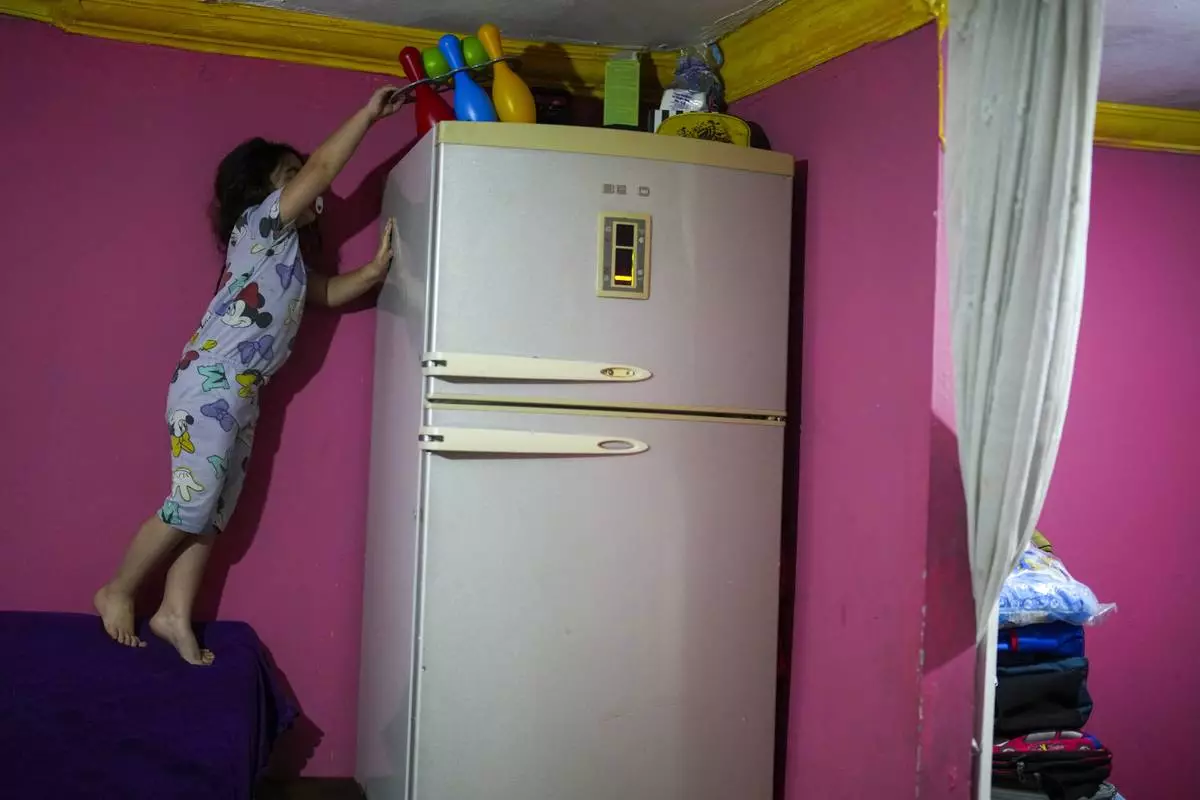
Dilan Sahin, 5, tires to reach her toys in her family's one-room apartment in the Tarlabasi neighborhood in Istanbul, Turkey, Wednesday, Dec. 4, 2024. (AP Photo/Francisco Seco)
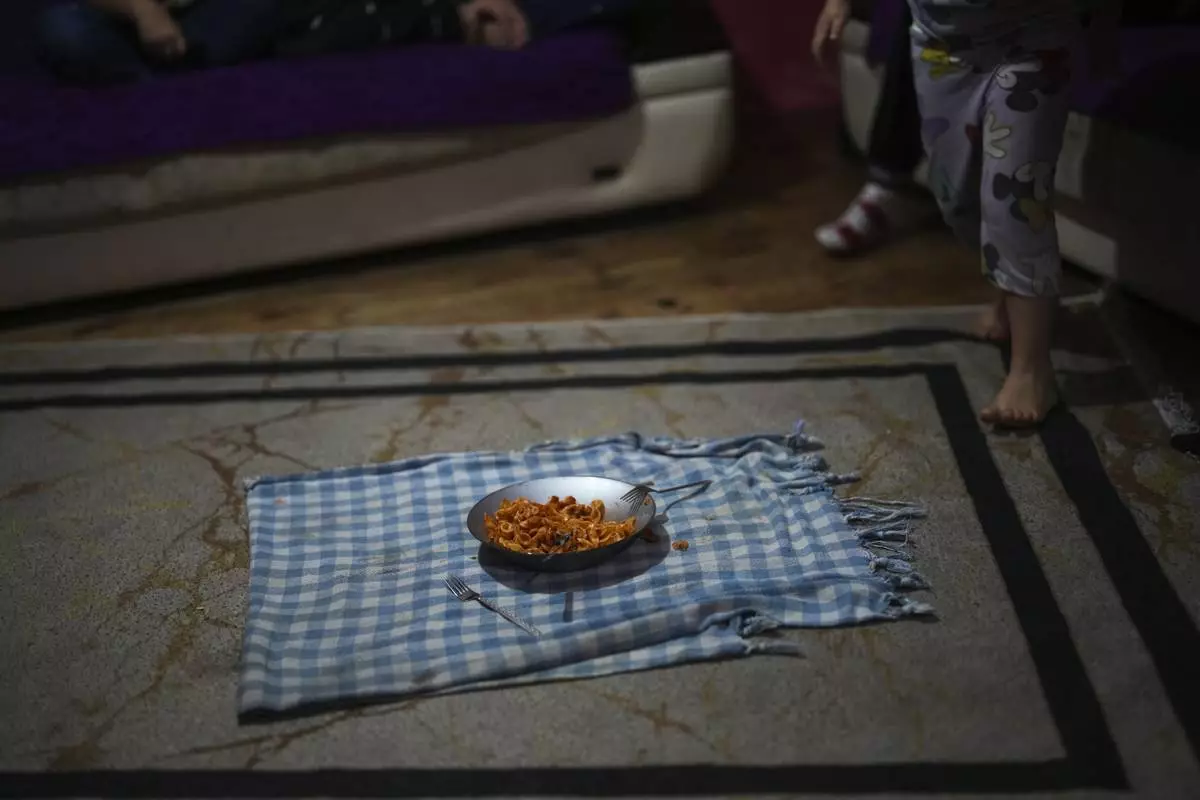
A plate of pasta sits on a tablecloth in the Sahin family's one-room apartment in the Tarlabasi neighborhood in Istanbul, Turkey, Wednesday, Dec. 4, 2024. (AP Photo/Francisco Seco)
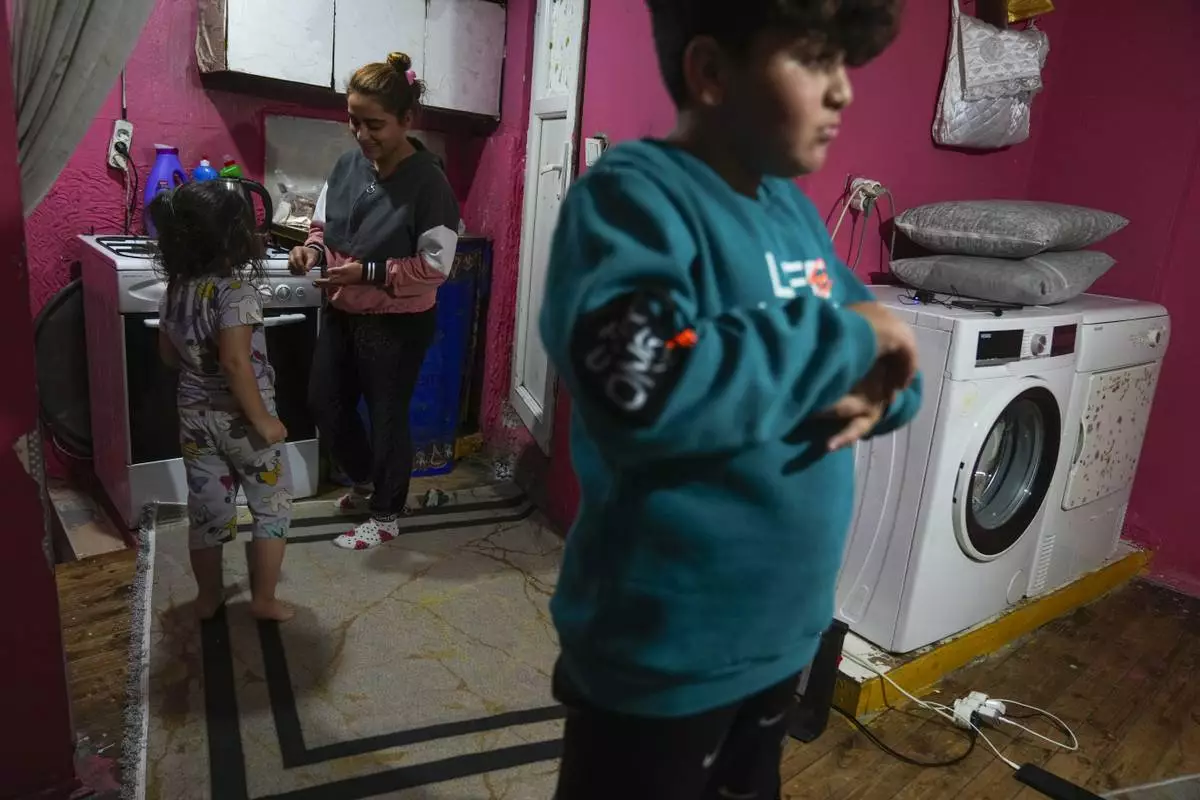
Rukiye Sahin, 28, talks to her daughter Dilan, 5, near her son Atakan, 11, in the family's one-room apartment in the Tarlabasi neighborhood in Istanbul, Turkey, Wednesday, Dec. 4, 2024. (AP Photo/Francisco Seco)
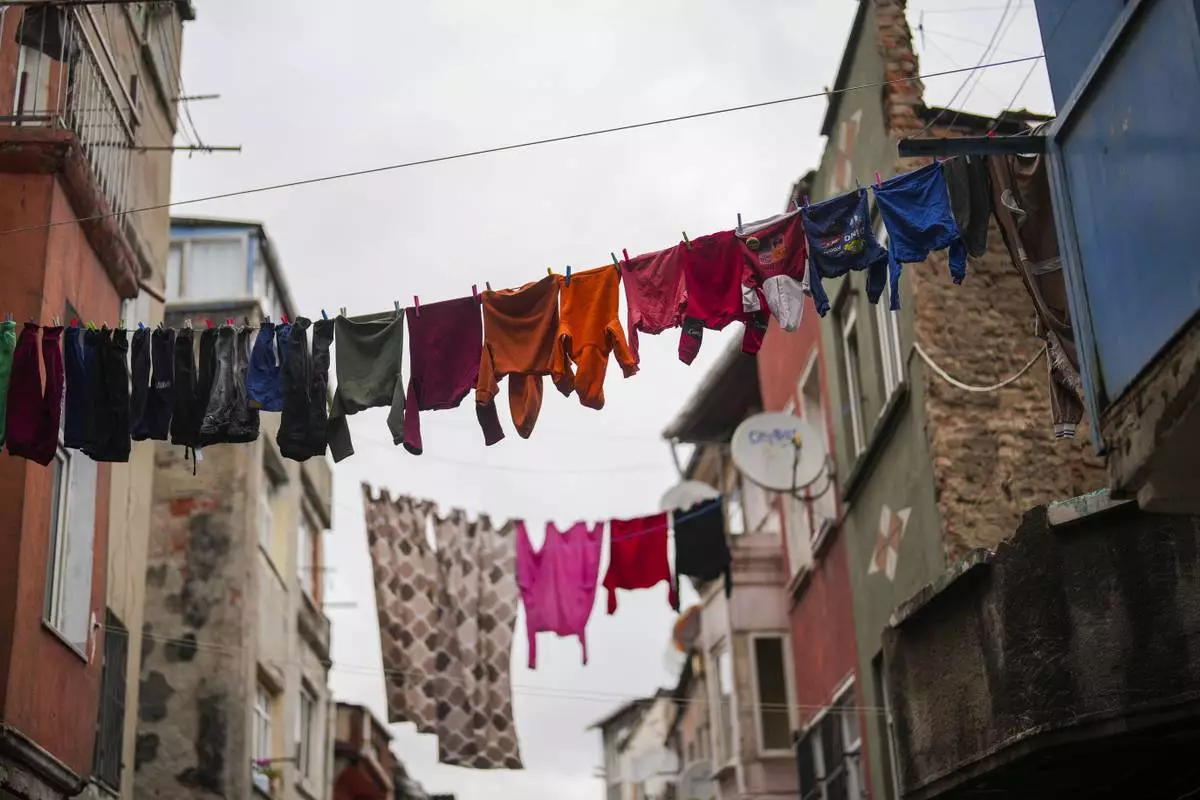
Children's laundry hangs over a street in the Tarlabasi neighborhood in Istanbul, Turkey, Wednesday, Dec. 4, 2024. (AP Photo/Francisco Seco)
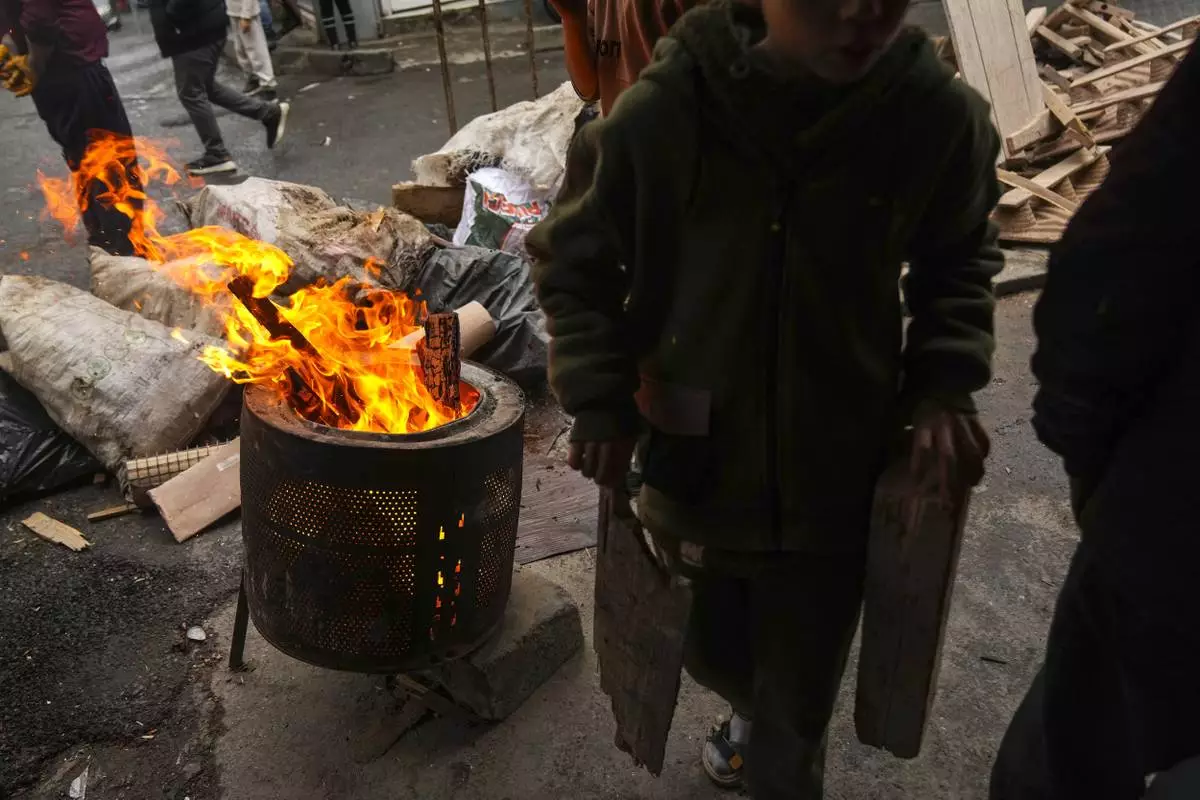
Local boys gather pieces of wood to burn for heat in the Tarlabasi neighborhood in Istanbul, Turkey, Wednesday, Dec. 4, 2024. (AP Photo/Francisco Seco)
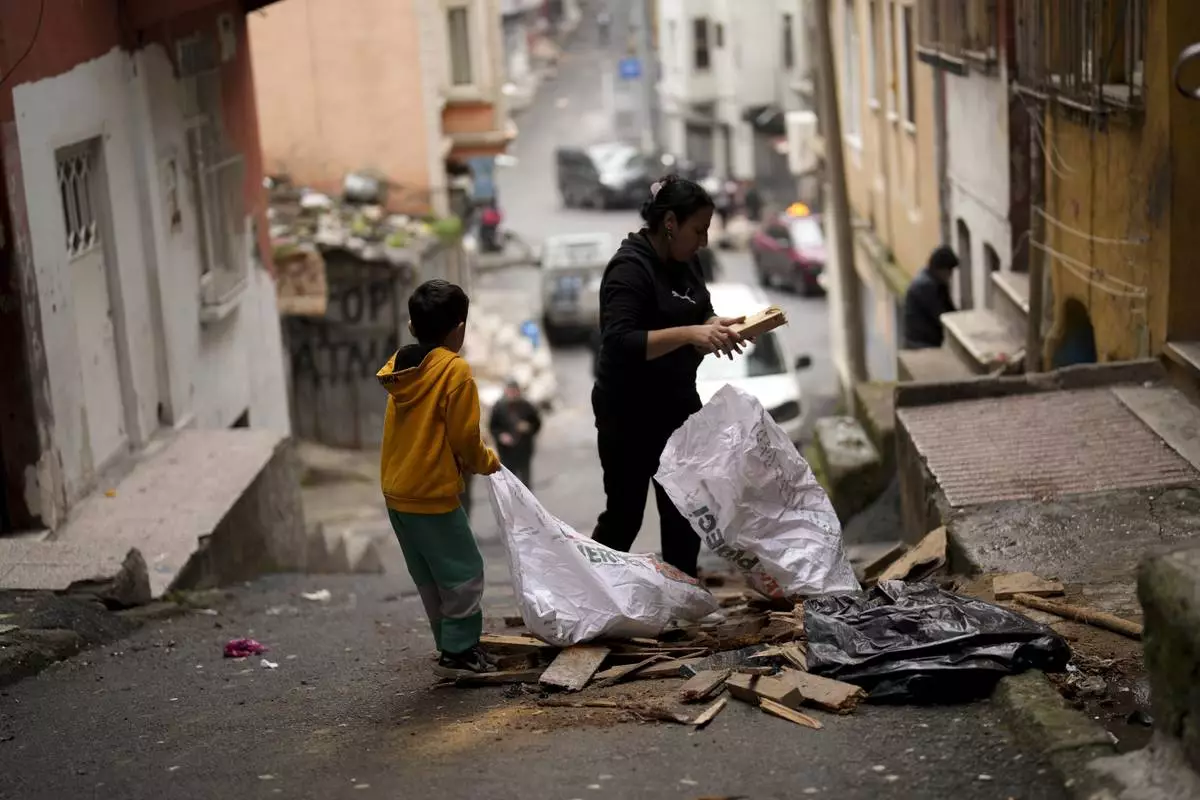
Residents gather pieces of wood to burn for heat in the Tarlabasi neighborhood in Istanbul, Turkey, Wednesday, Dec. 4, 2024. (AP Photo/Francisco Seco)
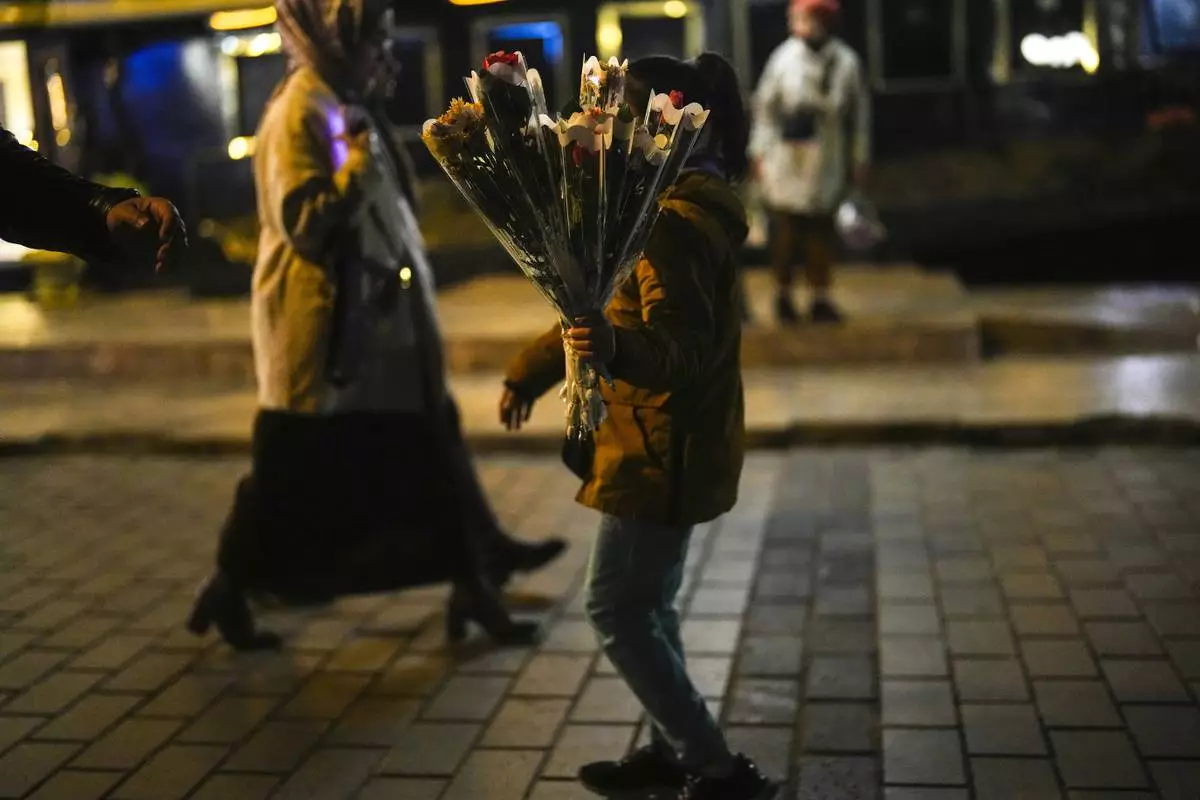
A girl sells flowers to passersby on the Karakoy sea promenade in Istanbul, Turkey, Friday, Dec. 6, 2024. (AP Photo/Francisco Seco)
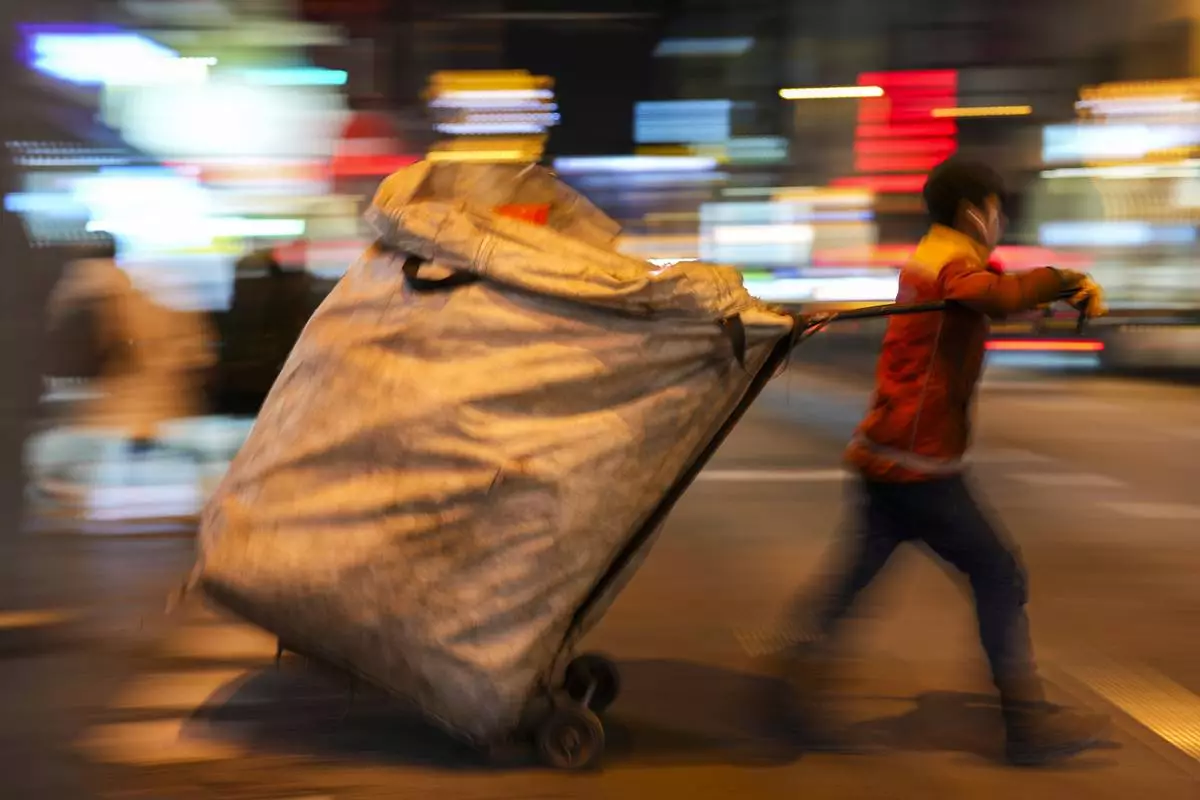
A boy pulls a cart to collect items as he scavenges in the Kadikoy district in Istanbul, Turkey, Monday, Dec. 16, 2024. (AP Photo/Francisco Seco)




